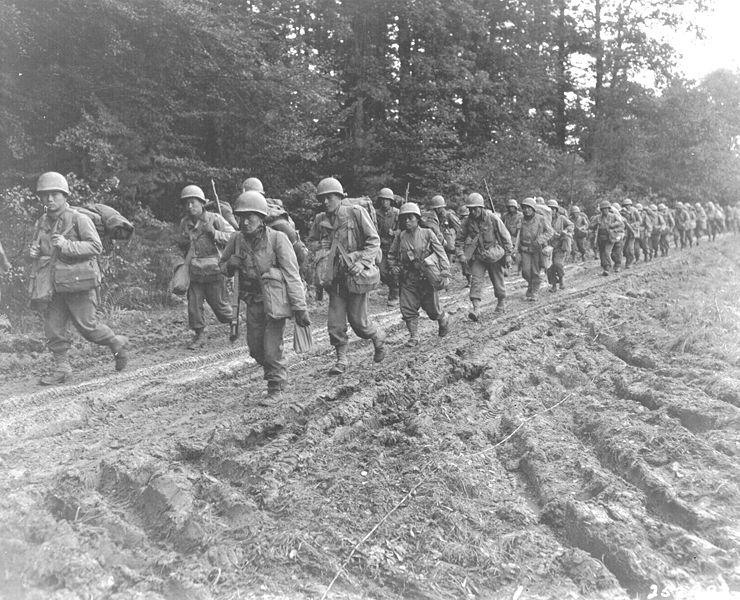Japanese Americans remember ‘darkest hour,’ on Pearl Harbor Day (with video)
Japanese-American infantrymen of the 442nd Regimental Combat Team hike up a muddy French road in the Chambois Sector, France, in late 1944. (Photo from the Army Center for Military History, via Wikimedia Commons.)
On this day, 70 years ago, Dec. 7, 1941, Japan bombed the Pearl Harbor Navy Base in Hawaii.
The surprise attack propelled the United States into World War II, fighting not only the Japanese but also the Germans and Italians, and led American leaders to implement one of the most sweeping suspensions of the U.S. Constitution. More than 100,000 Japanese Americans were forced into relocation camps away from coastal areas, fearing they would aid the Japanese in attacks on America.
Of course there’s no evidence that anything like that ever did or even would have happened. And, in fact, many Japanese Americans petitioned the United States government to be allowed to fight in the U.S. military.
Terry Shima, an historian with the Japanese American Veterans Association, served in the U.S. military in the last days of World War II, in Italy.
“Pearl Habor was the darkest hour of Japanese American history, when we were treated as enemy aliens,” he said. “Today, on the other hand, we are considered as just Americans. “This transformation was caused, in part, by the 25,000 Japanese Americans who served in the U.S. Army, 800 of them who made the ultimate sacrifice to defend American Democracy and to prove Japanese American loyalty to their country.”
Initially, Japanese Americans were given a draft status of 4C (enemy alien) meaning they could not serve in the armed forced and weren’t subject to being drafted. Most of those already serving were forced out of the military, but over time, they clamored to serve their country.
One of them was Virgil Westdale, who served in the Japanese American 442nd regimental combat team and fought in Europe against Italy and Germany.
“I realized there was some gathering of the Japanese and prejudice was looming on the horizon, so my brother and I kept pretty quiet who we were,” Westdale said. “We felt that the bombing of Pearl Harbor was a horrible act, but it was one of those things we didn’t know much about. We had to just wait.”
The 442nd, nicknamed the Go For Broke regiment, was one of the most heavily-decorated units in American army history and participated in important events, including liberating the concentration camp at Dachau.
“We were all trained to do our very best all the time, whether it be working or training in combat,” Westdale said.
Westdale was actually a pilot before the war, but because of an executive order was unable to serve in the Army as a pilot. When war broke out, his license was taken by an FAA agent.
“I waited for him to explain why, but he wasn’t going to,” Westdale said. “I thought that was a bit strange, but I was trained not to question authority … so I gave it to him.”
Instead, he served as a private in the field artillery.
